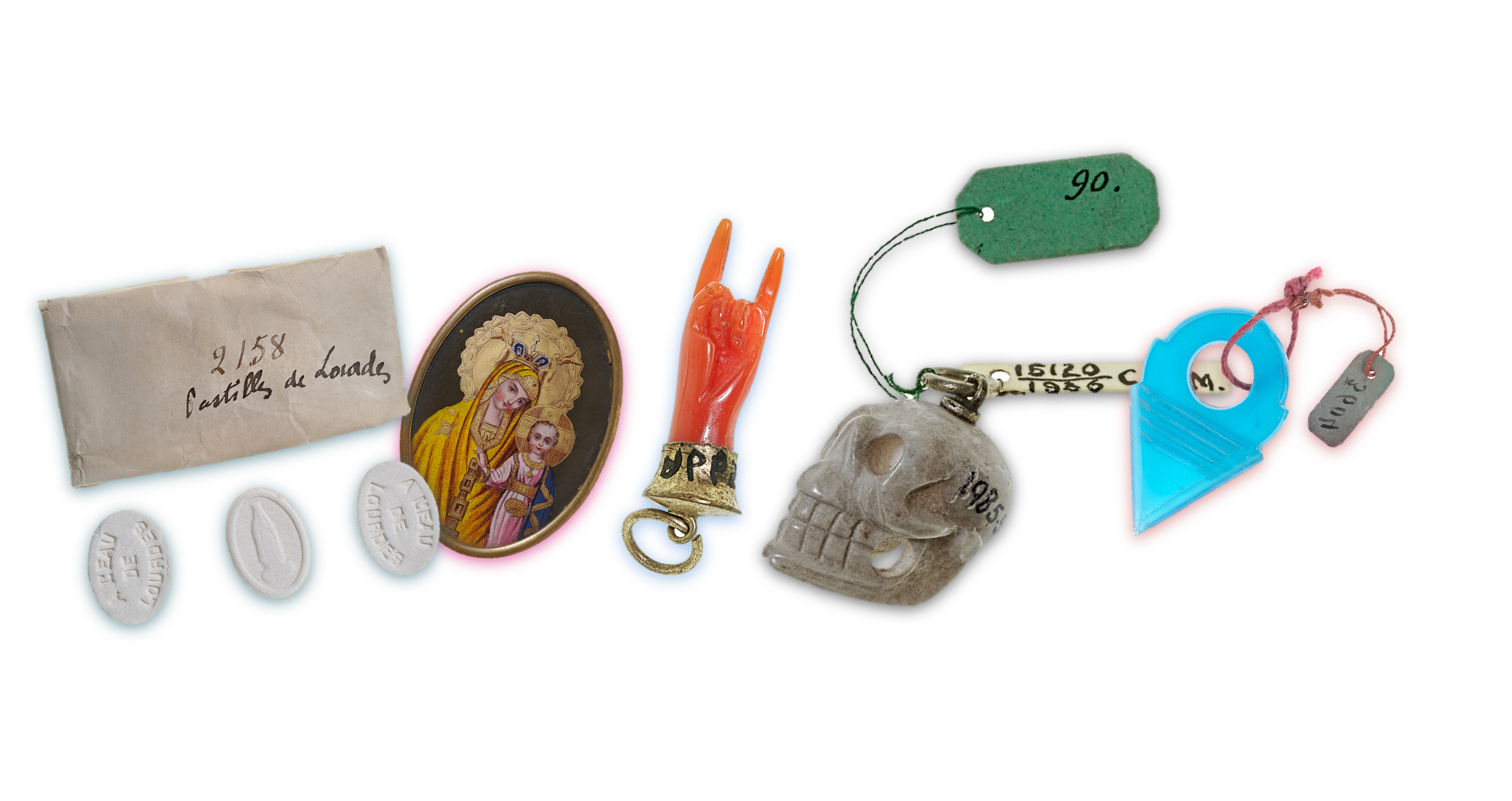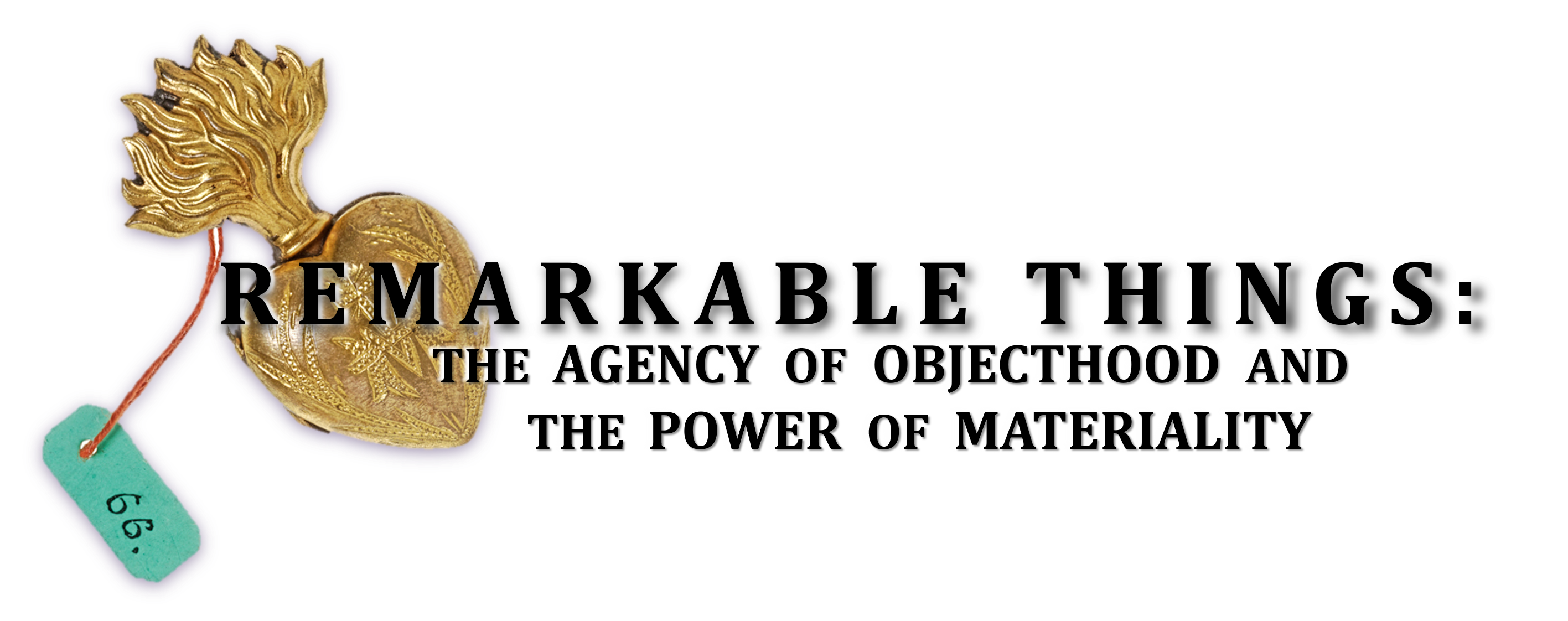Remarkable Things: The Agency of Objecthood and The Power of Materiality
Conference organised by Kathryn Thompson, PhD Candidate in the Department of Classics and Ancient History & HRC Doctoral Fellow 2017-18.
Saturday 10th March 2018
Registration for this conference is now CLOSED.
Keynote Speakers:
-
Professor Patricia Spyer (The Graduate Institute, Geneva)
-
Dr Lambros Malafouris (Oxford University)
* URGENT * - Schedule Update
Apotropaic art, symbols or objects are those which have – or are reputed to have - the power of averting evil influence or ‘bad luck’.
The very idea of an apotropaic object stands at the centre of theory seeking to concretise objecthood and materiary power. Apotropaic things are, in their very nature, possessed of an agency that both transcends their status as a material object yet is also inextricably tied to it: their physicality enables them to be purposefully placed in liminal spaces or carried close on the body; the materials they are made from carefully chosen and frequently bizarre or rare; their form, shape and construction often highly specific and closely allied to tradition and ‘folklore’.
Therefore, the repellence of forces which are abstract and amorphous relies intrinsically upon the materiality and apparent ‘concreteness’ of specific objects. In turn, the ways in which society, throughout time and across culture, has attempted to reconcile the seemingly dialectical nature of such items stands at an interdisciplinary confluence.
- The sorts of objects that have been perceived in this way and how objecthood is tied to their interpretation and significance;
- The way such objects operate/are believed to operate;
- How these sorts of objects construct and convey their power/meaning;
- The role these objects have played in different disciplines, both focally and epistemologically;
- The ways in which such objects have shaped culture, custom, behaviour, thought and academic discourse;
- The ways in which different disciplines have dealt with such objects and their ramifications;
- Whether or not we continue to create ‘talismans’, 'fetishes', and ‘relics’, etc., or attribute these concepts to objects extraneously;
- Finally, how seminal principles outlined by figures such as Gell, Mitchell and Pietz, who have authoritatively theorised on objecthood and agency, play out practically and contextually. [1]
Such objects might include religious icons, jewellery, biological specimens, clothing, funerary equipment, materia medica, portraiture or relics, and their perceived ‘power’ might be grounded in faith, ritual, superstition, biopolitics, cultural memory, memorialisation, consumerism or even medical adherence.
In our modern era, the nature of ‘objecthood’ is undergoing great change; ‘virtual reality’ and the rise of virtual museums, online collections, 3D printing, and sensory simulation ensure that objecthood, and our [un]changing relationship with it, is as relevant as ever. Amidst the evolving status of objecthood, do we continue to create apotropaia? If so, where might we identify them? How might we extend this concept to scientific, medical or technological 'objects', if at all?
This conference will investigate how recent developments in the study of material religion, neuroarchaeology, semiotics and phenomenology might help us better understand not only such objects themselves, but also their many guises and surprising pervasiveness, as well as our ongoing attempts to typologise and demystify them.
Following the conference, we intend to submit proposal to Warwick Series in the Humanities (in partnership with Routledge) for a collected volume.
CALL FOR PAPERS:
We therefore invite abstracts of up to 300 words for 20-minute papers on topics including, but not limited to:
- The breadth and fluidity of the apotropaic as a category of material, and the sorts of material - both ancient and modern - that has been responded to as apotropaia;
- The proximity of ‘apotropaic’ (or similar) objects and their conceptualisation to our early understandings of medicine and disease;
- The significance and power of naming such objects – ‘apotropaic’, ‘relic’, ‘icon’, ‘totem’, ‘talisman’, ‘fetish’, etc.;
- Our need, both socio-culturally and intellectually, to typologise, classify and deconstruct such material;
- The role of collectors and collections in our relationship with these objects;
- The potential for developments in Neuroarchaeology, Phenomenology, Semiotics and Material Religion to further our understanding of these objects, their function, creation and perception as well as our ongoing intellectual fascination with them;
- Whether we can separate the conceptual toolkit and terminology typically used to discuss and categorise these objects from their often-problematic origins in colonialism, racism, and modes of exoticisation or othering;
- The role of medicine, science, technology and the rapidly changing nature of ‘objecthood’ in the modern creation, perception and definition of such objects;
- The sorts of present-day ‘objects’ which have 'power' over us, or the sorts of objects we invest with similar/‘equivalent’ ‘power’ today.
We also welcome proposals for workshops of between 40-60 mins on particular genres or case studies of material, museum collections or related projects. To propose a workshop, please submit abstracts of no more than 500 words detailing the theme, structure, duration, perceived outcomes including activities/item handling and any specific resources required.
Send all abstracts to remarkablethingswarwick@gmail.com along with your name (if more than one for workshops, please give name of all contributors), title/position, and institutional affiliation.
Deadline for submissions: 1st December 2017
POSTER SESSION
Posters on relevant research, projects and ideas - from any range of disciplines - can be displayed for the full duration of the conference schedule, and time allocated for viewing and discussing these will take place during lunch, refreshment breaks and the wine reception at the end of the event.
To submit a poster or similar materials for display, please send an electronic copy (for pre-existing posters) OR a 200-word abstract to remarkablethingswarwick@gmail.com by 1st December 2017.
CONFERENCE FEES:
Speakers and Delegates
External Full Rate - £20.00; External Student Rate - £12.00; Warwick Staff and Students - £8.00
http://www2.warwick.ac.uk/fac/arts/hrc/confs/rt
remarkablethingswarwick at gmail dot com
Follow us on Twitter:

Images reproduced courtesy of Pitt Rivers Museum, University of Oxford. Top of Page: 1985.52.33; Bottom of Page, Left to Right: 1985.52.1084, 1985.52.353, 1985.52.2, 1985.52.43, 1985.52.1700; Pitt Rivers Museum, University of Oxford.
[1] Gell, Alfred, Art and Agency (1998); Mitchell, W.T. J., What Do Pictures Want (2005); and Pietz, William, The Problem of the Fetish, II: The Origin of the Fetish (1987).
Saturday 10th March 2018
remarkablethingswarwick at gmail dot com

